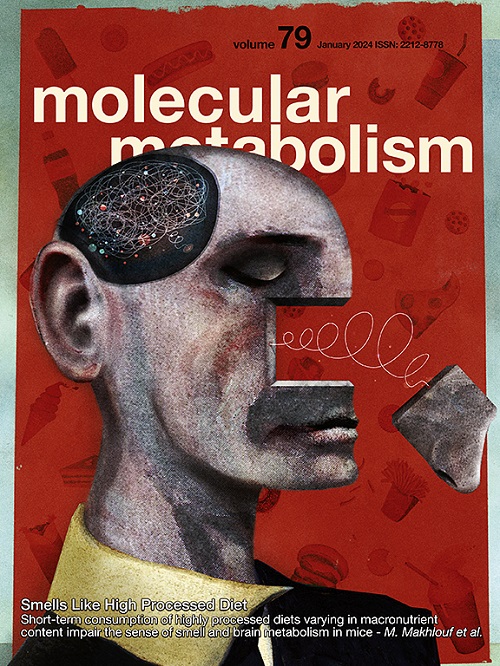Myeloid-specific CAMKK2 deficiency protects against diet-induced obesity and insulin resistance by rewiring metabolic gene expression and enhancing energy expenditure
IF 6.6
2区 医学
Q1 ENDOCRINOLOGY & METABOLISM
引用次数: 0
Abstract
Objective
Obesity is associated with chronic, low-grade inflammation in metabolic tissues such as liver, adipose tissue and skeletal muscle implicating insulin resistance and type 2 diabetes as inflammatory diseases. This inflammatory response involves the accumulation of pro-inflammatory macrophages in these metabolically relevant organs. The Ca2+-calmodulin-dependent protein kinase kinase-2 (CAMKK2) is a key regulator of cellular and systemic energy metabolism, and a coordinator of macrophage-mediated inflammatory responses. However, its role in obesity-associated metabolic dysfunction is not fully defined. The aim of this study was to determine the contribution of CAMKK2 to the regulation of inflammation and systemic metabolism during diet-induced obesity.
Methods
Mice with myeloid-specific deletion of Camkk2 were generated and challenged with a high-fat diet. Metabolic phenotyping, histological analyses, and transcriptomic profiling were used to assess whole-body metabolism, liver lipid accumulation, and gene expression in macrophages and adipose tissue.
Results
Myeloid-specific Camkk2 deficiency protected mice from high fat diet-induced obesity, insulin resistance and liver steatosis. These protective effects were associated with rewiring of metabolic and inflammatory gene expression in both macrophages and adipose tissue, along with enhanced whole-body energy expenditure.
Conclusions
Our data establish CAMKK2 as an important regulator of macrophage function and putative therapeutic target for treating obesity and related metabolic disorders.
髓细胞特异性CAMKK2缺乏通过重新连接代谢基因表达和增加能量消耗来防止饮食引起的肥胖和胰岛素抵抗。
肥胖与肝脏、脂肪组织和骨骼肌等代谢组织的慢性、低度炎症有关,暗示胰岛素抵抗和2型糖尿病是炎症性疾病。这种炎症反应涉及促炎巨噬细胞在这些代谢相关器官中的积累。Ca2+-钙调素依赖性蛋白激酶激酶2 (CAMKK2)是细胞和全身代谢的关键调节因子,也是巨噬细胞介导的炎症反应的协调者。在这里,我们证明了骨髓特异性Camkk2缺陷小鼠免受高脂肪饮食引起的肥胖、胰岛素抵抗和肝脏脂肪变性。这些保护作用与巨噬细胞和脂肪组织中代谢和炎症基因表达的重新布线以及全身能量消耗的增加有关。我们的数据证实CAMKK2是巨噬细胞功能的重要调节因子,也是治疗肥胖和相关代谢紊乱的潜在治疗靶点。
本文章由计算机程序翻译,如有差异,请以英文原文为准。
求助全文
约1分钟内获得全文
求助全文
来源期刊

Molecular Metabolism
ENDOCRINOLOGY & METABOLISM-
CiteScore
14.50
自引率
2.50%
发文量
219
审稿时长
43 days
期刊介绍:
Molecular Metabolism is a leading journal dedicated to sharing groundbreaking discoveries in the field of energy homeostasis and the underlying factors of metabolic disorders. These disorders include obesity, diabetes, cardiovascular disease, and cancer. Our journal focuses on publishing research driven by hypotheses and conducted to the highest standards, aiming to provide a mechanistic understanding of energy homeostasis-related behavior, physiology, and dysfunction.
We promote interdisciplinary science, covering a broad range of approaches from molecules to humans throughout the lifespan. Our goal is to contribute to transformative research in metabolism, which has the potential to revolutionize the field. By enabling progress in the prognosis, prevention, and ultimately the cure of metabolic disorders and their long-term complications, our journal seeks to better the future of health and well-being.
 求助内容:
求助内容: 应助结果提醒方式:
应助结果提醒方式:


